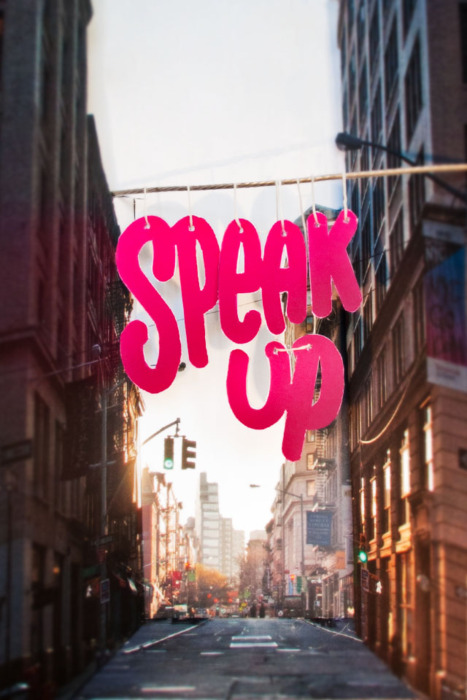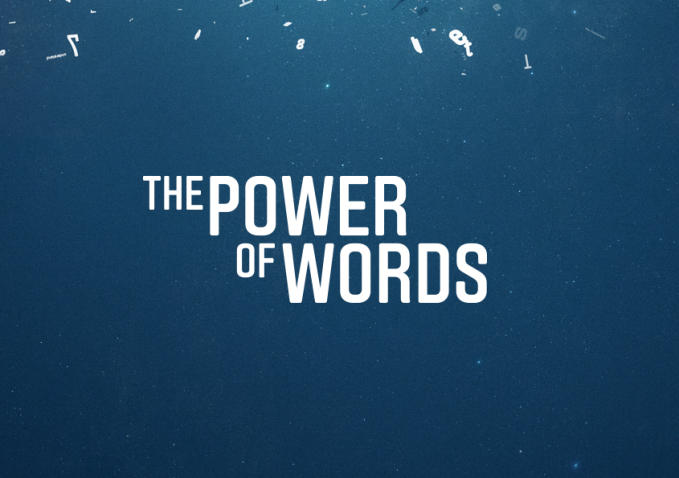The 3 Words That Will Limit Your Dreams
We all speak to ourselves. Whether it’s subconsciously, consciously in our heads, or – like me – you embrace your inner-insanity and you have a tendency to speak to yourself out loud.
We tend not to think about how we talk to ourselves, after all maintaining a train of thought in our heads is one of the most natural things we do. I recently got more in-tune with my own voice in my head, and I noticed I didn’t like a lot of what I said.
The way we speak to ourselves has such huge value. It shapes our view of ourselves, which in turn will form how we view others, and eventually how we view the world at large. So it would make sense that we paid attention to the things we say to ourselves, right?

(Image via)
There are three key words which, through reading and self-observation, I’ve discovered that I and others say to ourselves – and, in turn, to others – that limits our beliefs, our dreams, and our happiness.
SHOULD
Removing it will help with: Staying true to yourself, your heart, and your dream.
How we often use it:
‘I SHOULD take this promotion, it’ll be good for my career’.
‘I SHOULDN’T say anything, it might get me in trouble’.
‘I SHOULD be more productive/healthy/happy’.
We say it ALL the time, you probably hear the word hundreds of times a day. We become immune to it and don’t notice it. The word dwells within us and spills out of us regularly. Why is this a bad thing though?
Take a second to really think about what the word SHOULD actually means. Does it mean something you WANT to do? Does mean doing something that your GUT tells you to do? Does it mean following your TRUE SELF and your TRUE PATH? No. The word means fulfilling the actual or perceived needs and desires of something external and separate to you.
SHOULD removes you and your heart from the equation, suddenly your action and your focus does not come from you but from somewhere external. We lose control, we lose our dream, and we lose our happiness. Taking SHOULD out of your vocabulary will empower you hugely.
When I realised I used it all the time, it was a revelation. And the real kicker is that it creates an environment of thought that you’ve already failed. Try it. Try saying ‘I SHOULD do this’. You feel like you’ve already failed before you’ve even started. So take SHOULD out of your mouth and your head and instead say to yourself ‘I WANT to do this’, ‘I am DREAMING of this’, ‘I WILL do this’. And suddenly you’re looking to the future, you’re looking to YOUR action and heart, you become the master of your own destiny.
JUST
Removing it will help with: Valuing yourself, your dreams, and your place in the world.
How we often use it:
‘It’s just something I want to do’.
‘I just had some down time at the weekend’.
‘Just a few more months in this job and I can quit’.
This word smooshes itself unnecessarily into our sentences and our thoughts. ‘I just need this to get that contract’. ‘If I could JUST work a little bit harder, I could get that promotion’. There are two core components as to why this sells us way short of who we are.
To say JUST devalues what you are asking of yourself, and it devalues your desires. ‘I JUST want to live in a home with people I love’. This is a perfectly innocent statement. By saying JUST though, we undervalue our desire and dream. By saying JUST we have robbed our dream of worth: implying that it’s easy, or simple, or basic, when all these elements are irrelevant, what’s relevant is the thing that’s true to your dream.
Using JUST like this also subtlety tells us that who we are, what we do, and the power we have as an individual is not enough. That what you have now is not enough. This raises a key issue when striving for your dream. You may have lofty dreams. Amazing dreams. And that’s brilliant. What will truly makes us happy, though, is cultivating a life that is true to the spirit and core values of our dreams: happiness is a state of being, not a destination.
Cultivate a life that is true to yourself and true to your dream – the dream gives us purpose, and living by our core values gives us happiness. And that’s why JUST is dangerous. Because it quietly tells you the opposite – that happiness is a place you can reach, and if you JUST had a little more, you could get there.
Luckily, JUST is simple to eradicate from your thoughts: drop it from the sentence. Just drop it from the sentence!
What makes it easier is cultivating an attitude of gratitude in your life – being thankful for the wonderful things around you, the experiences you have, and being SPECIFICALLY thankful for those things every day – and simply remembering that beautiful statement: happiness is a state of being, not a destination.
BUT
Removing it will help with: Remaining positive, being outwardly focussed, and being true to yourself.
How we often use it:
‘It’s a lovely piece of writing, but I think I could cut the word count’.
‘I want to go travelling, but I don’t have the money’.
‘I would like to exercise more, but I don’t have the discipline’.
This word is particularly tricky to remove from our vocabulary because it has such a practical use. We can use it to – if you’ll excuse the pun – butt two ideas or sentences up against each other and form a nice coherent passage of thought. So you might ask, why stop saying it? Well, there are two key ways it can damage our thoughts.
It is a word that is littered with bad connotations and negativity. No-one explains this better than Dale Carnegie in How to Win Friends and Influence People. He shows the true power of removing BUT both from within in our heads and when speaking to others.
Carnegie uses the example of a child who’s done unexpectedly well at school, this is how it might go down in our normal experience with BUT: ‘We’re really proud of you, Johnnie, for raising your grades this term. BUT if you had worked harder on your algebra, the results would have been better’.
Instead, we can take out BUT and switch the emphasis around: ‘We’re really proud of you, Johnnie, for raising your grades this term, and by continuing the same conscientious efforts next term, your algebra grade can be up with all the others’.
We can turn a negative thought and a negative situation into one that is positive, forward focussed, and that firmly keeps us and our dreams in the driving seat. We’re in charge of our action and our destinies.
The other more subtle issue with using BUT that we often torment ourselves with – and, inadvertently, others – is the creation of dichotomies in our minds. A dichotomy is a division or contrast between two things.
When talking about your dreams, you might say something like ‘I would love to be an artist, BUT I won’t be able to earn enough money’. Now here we have posed two options to ourselves – be an artist and don’t earn money, or don’t be an artist and earn money. That makes no sense, right? You could be a success as an artist, and you could fail as a banker. Saying BUT gives us a false choice and a false dichotomy. Who says the two things are separate? Why can’t you be an artist AND earn money? Or is earning lots of money, in fact, even part of your dream? Remove the dichotomy.
There are not two things here to chose from, there is one. And it’s you. It’s your heart and your dream, and when you look from within your heart there are no dichotomies there because they are drawn together as one. Through YOU.

(Image via)
BE LIMITLESS
This all seems like a lot to take on board, right? Quite overwhelming? Well, consider this instead. You can change your entire view of yourself, on life, and the world by taking these three words our of your thoughts and out of your mouth.
Instead you can empower and value yourself and your dreams, and remain focussed on the things in life you are grateful for, see the world from the one true heart that fuels your being and your happiness.
Try it out for yourself. Tell these words that they SHOULD JUST BUT out. Watch your thoughts and your words, and listen for when these ones crop up. Don’t ignore it, rephrase it. And soon you’ll rephrase your view of everything.
Try it out – one word a day – and tell me how you got on! How did it make you feel? Did you notice a change in yourself? Has it brought you closer to your dream and to yourself?
Guest blog by Ioan Holland.
If you enjoyed this article, why not check out ‘Confessions of a Part Perfectionist: Why Being Perfect Isn’t Worth It’?
Tags: dreams Joy life lessons positive words success vocabulary
Categories: Mirror Mirror: Self Improvement Wise up!
2 Comments
Brilliant article! Such an interesting point about the dichotomies we can set up in our minds and the part and power that language can play in that. As Norman Vincent Peale said: “Change your thoughts and you change your world.” Thanks for such inspiring ideas 🙂